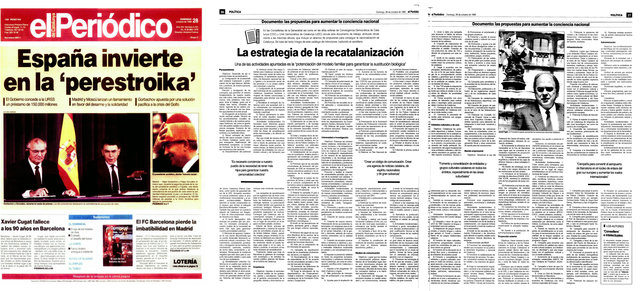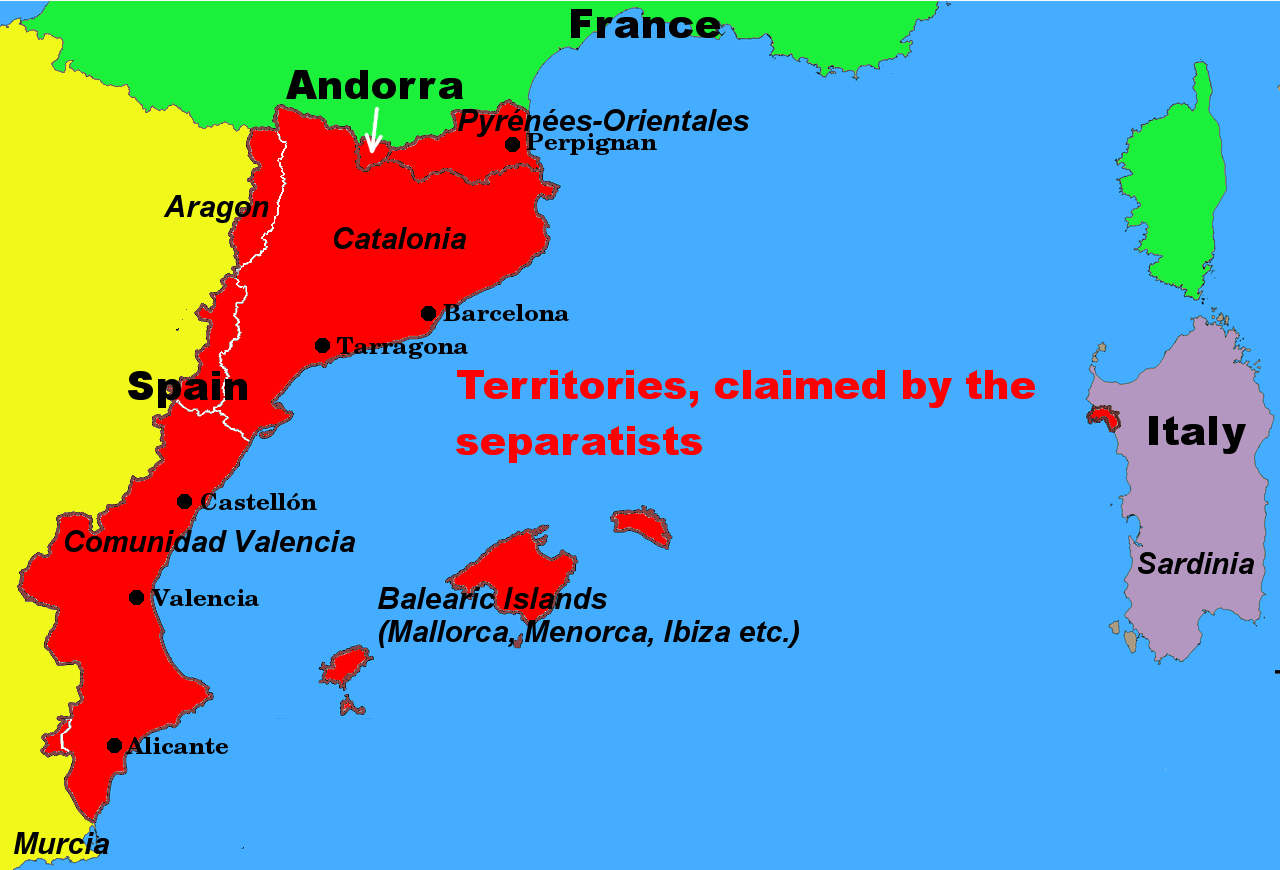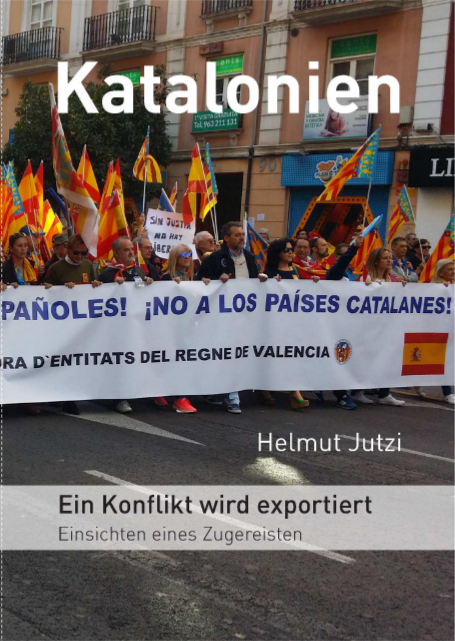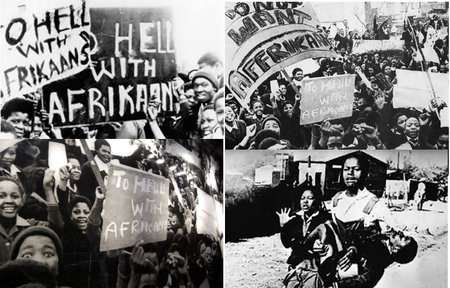| | | | And at continuation of this series about languages imposition and democracy Click here to subscribe or cancel your subscription |
In the autonomous regions of Spain there is language dispute and language imposition. You want to have some facts about languages? This series provides information and consists of 6 parts:
1. South Africa: Bloody insurrection against language imposition
2. Catalonia: language imposition and the division of a nation click here to read part 2
3. Language imposition, falsification of history and indoctrination click here to read part 3
4. Language impositions in the Ukraine click here to read part 4
5. Ways out of language conflicts - What is Language? click here to read part 5
6. Language protection - does this work in France? click here to read part 6
Language imposition and democracy
Part 1 South Africa: Bloody insurrection against language imposition
Everyone born before 1960 will probably remember. The 1976 Soweto uprising marked the beginning of the end of the racist apartheid regime in South Africa. Hardly anyone remembers what triggered it. With the Afrikaans medium Decree Afrikaans, the language of the Boers, was to be introduced as the language of instruction in high schools. About 20.000 pupils from the township went on the streets with slogans like „To hell with Afrikaans!“ and „Afrikaans must be abolished“. About 700 pupils were killed, 176 killings were admitted by the South African police. This uprising became at the same time a memorial as to how the imposition of languages can lead to violence.
One finds language imposition again and again used as a dictatorial means of rulers and governments world-wide. In the EU this instrument can be found above all in the Baltic states and Catalonia, in Europe in Ukraine and Turkey. Outside Europe, the list of these conflicts does not end with Algeria, Libya, India and Pakistan.
In the following, some of these conflicts will be described in the context of history and politics and the question of what language actually means will be explored.
The imposition of a language in South Africa
Apartheid - History of Racist RegimeIn 1976 South Africa was a country where a white minority had divided the population into different classes along the lines of skin colour. Leading the white minority were the Boers, descendants of the Dutch, who had already settled the Cape in the 17th century. The decline of the Dutch and the rise of British imperialism led to South Africa becoming a British colony in the transition from the 18th to the 19th century. In 1833 the British Parliament decided to abolish slavery, depriving the Boers of their subsistence. They largely retreated into the hinterland and partly founded their own states (Boer republics). Gold and diamond finds in the second half of the 19th century led to the immigration of other European ethnic groups, which essentially adapted to the English system, while the Boers, although in the minority, partly successfully waged wars against the English (1st Boer War).The spark, that set Soweto aflame: Language imposition
But in the end it was about the rule over the rich gold and diamond mines and thus the British felt forced to invest in a 2nd Boer War (1899-1902), especially as the Boers threatened to ally themselves with the then German Reich. After long peace negotiations between British and Boers, the South African Union was founded in 1910.
Throughout this period, peoples not coming from Europe did not play a decisive role, although, for example, the Zulu (a Bantu people originally from Congo) inflicted bloody defeats on the English in various battles in the 19th century.
The rise of National Socialism with its racial laws once again led to strong tensions between the British and the Boers, who sympathized with the Nazis. Although the politics of racism were discredited internationally after 1945, developments in South Africa were the opposite. The British national party and the party of the Boers (Afrikaaner Party) united and introduced a policy of increasing separation of the population groups (apartheid). A racism, was also common in the southern USA and the USA had practically replaced the British and French colonial empires at the end of the 2nd World War.
The white Dutch settlers had not been the first humans at the Cape. The San (Bushmen), a nomadic people of gatherers and hunters, had lived there for more than 10,000 years. The Zulu had immigrated to southern Africa in the 17th century, partly in the fight against the San, and other peoples such as the KhoiKhoi, Nama, Korana, Xhosa etc. who also lived there.
However, the „need“ for slaves for the white settlers could never be satisfied by the indigenous peoples already present in the Cape. For example, slaves from India, Malaya and Indonesia were abducted to South Africa, they differed from the indigenous African peoples by their comparatively lighter skin colour. They were usually referred to as 'Coloured', most of whom spoke Afrikaans and were treated relatively preferentially to black people. Mahatma Gandi was born in South Africa and was even able to become a lawyer there. But a racist experience showed him „his place“ and he started the fight that later made him the leader against British imperialism in India.
The worldwide decolonization of the 1950s and 1960s also strengthened the movements of the peoples of South Africa in their struggle against the rule of the white minority. However, the relatively high level of industrialization, investments in the country's gold and diamond mines and a relatively large white minority in the country, combined with a terrorist regime against the blacks, made the struggle for liberation much more difficult.
The number of languages spoken in South Africa was largely due to the multiple origins of the peoples living there. However, during apartheid there were only 2 official languages: English and Afrikaans. Afrikaans can be seen as a dialect of Dutch, which has developed independently over the centuries, such as American English from British English. Afrikaans was the language of the Boers and some Coloured, who often still used their original language.
While colonialism continued to crumble worldwide in the 1970s, especially in the Portuguese dominated Angola and Mozambique, a country with a common border with South Africa, the ruling minority tried to further consolidate its apartheid regime. Education had been a crucial prerequisite for the liberation struggle in all colonies, and so the ruling racists decided to introduce Afrikaans as a compulsory subject in high schools, knowing that the majority of blacks did not speak the language. As a rule, blacks were only taught in their tribal language anyway, and only a very few of them managed to get any higher education at all.
In 1976 the blacks took to the streets in Soweto near Johannsburg against the Africaans Medium Decree. First with the demand to abolish Afrikaans. „To hell with Afrikaans“, of course, was not directed against the language itself, but against the language imposition and was an expression of hatred of apartheid. The uprising was bloodily suppressed by the racists, many uprisings and their oppression followed until the oppressed races succeeded in eliminating racist rule in the early 1990s.
Today there are 11 official languages in South Africa, 9 indigenous languages, supplemented by English and Afrikaans.
| | | | And at continuation of this series about languages imposition and democracy Click here to subscribe or cancel your subscription |
Myths and deceptions of Catalan nationalism

Here you'll find the translation
The strategy of recatalanization
 1980 the Spanish journal "El Periodico" published a secret document about the strategy of the Catalan government. It shows in a frightening way the actual spiritual world of the separatist leaders.
1980 the Spanish journal "El Periodico" published a secret document about the strategy of the Catalan government. It shows in a frightening way the actual spiritual world of the separatist leaders.Now it is available in english translation.
Pancatalanism
the separatist's imperial claim
 The Catalan government exports the conflict into communities with Catalan population, supporting all efforts of the separatists including financial means to destroy Spain.
The Catalan government exports the conflict into communities with Catalan population, supporting all efforts of the separatists including financial means to destroy Spain. An important tool is the establishment of a language dictatorship that is not afraid to use the same means as Franco.
Separatist indoctrination

Click here to read the study
Publications
 The title says: "Catalonia, a conflict is exported. Insights of a migrant"
The title says: "Catalonia, a conflict is exported. Insights of a migrant"Sorry, up to now, this book is only available in German. However, drop us a line, if you are interested to learn more Contact.
